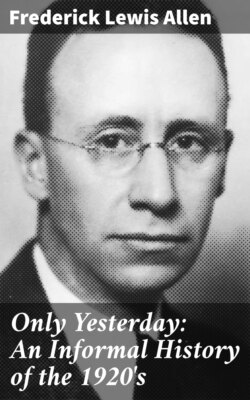Читать книгу Only Yesterday: An Informal History of the 1920's - Frederick Lewis Allen - Страница 15
На сайте Литреса книга снята с продажи.
[3]
ОглавлениеTable of Contents
The Boston police had a grievance: their pay was based on a minimum of $1,100, out of which uniforms had to be bought, and $1,100 would buy mighty little at 1919 prices. They succumbed to the epidemic of unionism, formed a union, and affiliated with the American Federation of Labor. Police Commissioner Curtis, a stiff-necked martinet, had forbidden them to affiliate with any outside organization, and he straightway brought charges against nineteen officers and members of the union for having violated his orders, found them guilty, and suspended them. The Irish blood of the police was heated, and they threatened to strike. A committee appointed by the mayor to adjust the dispute proposed a compromise, but to Mr. Curtis this looked like surrender. He refused to budge. Thereupon, on September 9, 1919, a large proportion of the police walked out at the time of the evening roll call.
With the city left defenseless, hoodlums proceeded to enjoy themselves. That night they smashed windows and looted stores. Mayor Peters called for State troops. The next day the Governor called out the State Guard, and a volunteer police force began to try to cope with the situation. The Guardsmen and volunteer police--ex-servicemen, Harvard students, cotton brokers from the Back Bay--were inexperienced, and the hoodlums knew it. Guardsmen were goaded into firing on a mob in South Boston and killed two people. For days there was intermittent violence, especially when Guardsmen upheld the majesty of the law by breaking up crap games in that garden of sober Puritanism, Boston Common. The casualty list grew, and the country looked on with dismay as the Central Labor Union, representing the organized trade unionists of the city, debated holding a general strike on behalf of the policemen. Perhaps, people thought, the dreaded revolution was beginning here and now.
But presently it began to appear that public opinion in Boston, as everywhere else, was overwhelmingly against the police and that theirs was a lost cause. The Central Labor Union prudently decided not to call a general strike. Mr. Curtis discharged the nineteen men whom he had previously suspended and began to recruit a new force.
Realizing that the game was nearly up, old Samuel Gompers, down in Washington, tried to intervene. He wired to the Governor of Massachusetts that the action of the Police Commissioner was unwarranted and autocratic.
The Governor of Massachusetts was an inconspicuous, sour-faced man with a reputation for saying as little as possible and never jeopardizing his political position by being betrayed into a false move. He made the right move now. He replied to Gompers that there was "no right to strike against the public safety by anybody, anywhere, any time"--and overnight he became a national hero. If there had been any doubt that the strike was collapsing, it vanished when the press of the whole country applauded Calvin Coolidge. For many a week to come, amateur policemen, pressed into emergency service, would come home at night to the water side of Beacon Street to complain that directing traffic was even more arduous than a whole day of golf at the Country Club; it took time to recruit a new force. But recruited it was, and Boston breathed again.
Organized labor, however, was in striking mood. A few days later, several hundred thousand steel-workers walked out of the mills--after Judge Gary had shown as stiff a neck as Commissioner Curtis and had refused to deal with their union representatives.
Now there was little radicalism among the steel strikers. Their strike was a protest against low wages and long hours. A considerable proportion of them worked a twelve-hour day, and they had a potentially strong case. But the steel magnates had learned something from the Boston Police Strike. The public was jumpy and would condemn any cause on which the Bolshevist label could be pinned. The steel magnates found little difficulty in pinning a Bolshevist label on the strikers. William Z. Foster, the most energetic and intelligent of the strike organizers, had been a syndicalist (and later, although even Judge Gary didn't know it then, was to become a Communist). Copies of a syndicalist pamphlet by Foster appeared in newspaper offices and were seized upon avidly to show what a revolutionary fellow he was. Foster was trying to substitute unions organized by industries for the ineffective craft unions, which were at the mercy of a huge concern like the Steel Corporation; therefore, according to the newspapers, Foster was a "borer from within" and the strike was part of a radical conspiracy. The public was sufficiently frightened to prove more interested in defeating borers from within than in mitigating the lot of obscure Slavs who spent twelve hours a day in the steel mills.
The great steel strike had been in progress only a few weeks when a great coal strike impended. In this case nobody needed to point out to the public the Red specter lurking behind the striking miners. The miners had already succeeded in pinning the Bolshevist label on themselves by their enthusiastic vote for nationalization; and to the undiscriminating newspaper reader, public control of the mining industry was all of a piece with communism, anarchism, bomb-throwing, and general Red ruin. Here was a new threat to the Republic. Something must be done. The Government must act.
It acted. A. Mitchell Palmer, Attorney-General of the United States, who enjoyed being called the "Fighting Quaker," saw his shining opportunity and came to the rescue of the Constitution.
